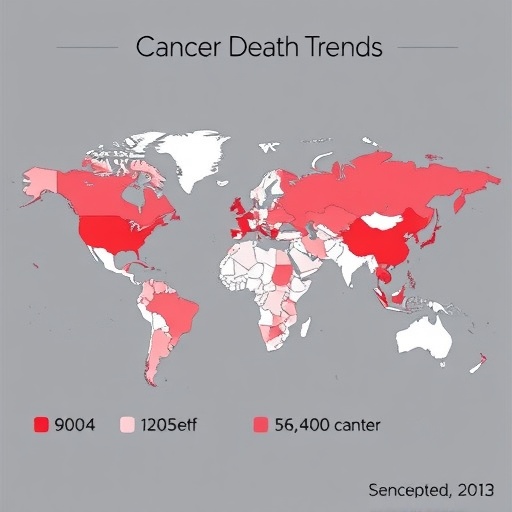In an alarming revelation, a groundbreaking study spearheaded by researchers Sun, KX., Liang, X., and Zhu, Q. has illuminated the global landscape of cancer-related premature deaths. Titled “Global patterns and trends in cancer-related premature death and their impact on life expectancy across 185 countries: a population-based analysis,” the research reveals profoundly significant findings that uncover the staggering burden of cancer on human health worldwide. As one of the leading causes of mortality, cancer continues to pose severe threats to life expectancy, impacting millions of individuals and families across various demographics.
The researchers meticulously analyzed data spanning numerous countries, offering insights into the global variability of cancer-related deaths. By investigating premature mortality—defined as deaths occurring before the age of 70—the study elucidates significant patterns that reveal disproportionate diseases burdened upon different populations. With cancer’s ascendancy as a leading determinant of early mortality, the research underscores a critical public health challenge that calls for immediate attention and action.
Central to the study’s findings is the stark contrast in cancer-related mortality rates across continents. While affluent nations exhibit comparatively low rates of premature cancer deaths, developing countries are beleaguered with higher metrics. This dichotomy raises pivotal questions concerning access to healthcare resources, early detection technologies, and effective treatment modalities. As the researchers decode statistical variances and trends, their findings resonate with a clarion call for improved healthcare policies and reform in resource allocation.
Moreover, the research reveals not only the patterns of premature death but also their significant repercussions on life expectancy. Across the examined countries, the estimated life expectancy after the age of 70 offers crucial insights into how cancer impacts longevity. The disparities highlighted in the analysis indicate that populations in high-burden countries experience diminished life spans, adding urgency to addressing systemic healthcare inequities. The relationships detailed in the study bear implications for public health frameworks aiming to promote longevity and quality of life.
Another intriguing aspect of the investigation centers on the role of preventive measures. The researchers delve into the potential of early detection, vaccination programs, and education surrounding healthy lifestyle choices. Such interventions have shown promise in reducing cancer incidence; however, disparities persist in implementing these programs in lower-income nations. Consequently, barriers to effective cancer prevention remain a pivotal area that demands further exploration and strategic planning.
The alignment of cancer research with socioeconomic indicators offers an avenue to comprehend the multifactorial dimensions of cancer mortality. The study meticulously correlates data regarding income levels, healthcare accessibility, and education with the incidence of cancer mortality. By unveiling these correlations, the analysis demands a nuanced viewpoint that includes social determinants of health in formulating cancer care policies aimed at reducing premature mortality.
Equally important, the researchers did not overlook the emotional and psychological facets associated with cancer-related deaths. The study’s findings advocate for the necessity of mental health support in communities grappling with the devastating impacts of cancer. As families contend with premature loss, the integration of mental health resources into public health strategies emerges as a vital dimension that deserves heightened focus.
The researchers’ work speaks to a broader objective: to mobilize governmental and non-governmental organizations toward addressing these findings through dedicated initiatives. Analyzing government responses, the study posits that awareness campaigns targeting cancer prevention and improved healthcare access must become paramount. In doing so, societies can take meaningful strides toward reducing the prevalence of premature death from this menacing disease.
The technological advancements in cancer research also paint an optimistic picture amid the overwhelming data. The emergence of artificial intelligence and genomics in cancer diagnostics provides a beacon of hope for future medical inquiries. Enhanced precision in identifying cancer types and treatment responses can significantly improve outcomes, potentially reducing mortality rates considerably.
Intriguingly, the analysis illustrates a growing trend toward global collaboration in cancer research. As countries share data and insights, an accumulation of knowledge enables researchers to develop comprehensive global strategies. This collaborative spirit among nations paves the way for transformational policies that could mitigate the rising tide of cancer-related deaths in the coming decades.
The study’s relentless pursuit to understand cancer’s global impact underscores the pressing need for worldwide awareness. As policymakers and healthcare providers seek to combat the growing burden of cancer, the implications of this research serve as a cornerstone for future initiatives aimed at fostering healthier populations. By harnessing the strengths of preventative measures, healthcare accessibility, and ongoing research, it is conceivable that we can alter the course of cancer mortality in the years ahead.
In summary, the study authored by Sun, KX., Liang, X., and Zhu, Q. embodies an essential step toward understanding the intricate landscape of cancer-related premature death. By compiling rich datasets and scrutinizing global patterns, the authors cast light on an urgent public health imperative. The ongoing pursuit of knowledge, advocacy, and reform lies at the heart of transforming these findings into actionable change, ultimately working towards extending life expectancy and enhancing the quality of life for countless individuals worldwide.
Subject of Research: Cancer-related premature death and its impact on life expectancy across 185 countries.
Article Title: Global patterns and trends in cancer-related premature death and their impact on life expectancy across 185 countries: a population-based analysis.
Article References:
Sun, KX., Liang, X., Zhu, Q. et al. Global patterns and trends in cancer-related premature death and their impact on life expectancy across 185 countries: a population-based analysis. Military Med Res 12, 56 (2025). https://doi.org/10.1186/s40779-025-00645-9
Image Credits: AI Generated
DOI: 10.1186/s40779-025-00645-9
Keywords: cancer, premature death, life expectancy, global health, public health policy, cancer prevention, socioeconomic factors, mental health, AI in cancer research, healthcare access.




